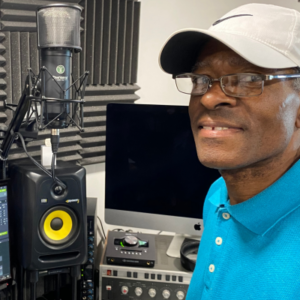Jack Ashford was born in 1934 in Philadelphia, Pennsylvania, where he attended the Granhof School of Music, following in the footsteps of John Coltrane and Dizzy Gillespie. He loved Jazz and learned to play a large collection of instruments, including vibraphone, marimba, and all kinds of percussion. He could make music with pretty much anything!
During the fifties, Ashford tried to establish a career in music, joining various Jazz combos. Around 1962 he was playing a series of shows at a club in Providence, Rhode Island, with the Charles Harris Jazz Trio, when he first played the tambourine during a performance. It was Charles Harris, the group’s leader and Hammond organ player, who came up with the idea, in an attempt to liven up the trio’s rendition of Dave Brubeck’s “Take Five”. Harris had found the tambourine in a local shop and bought it. He handed it to Ashford at the rehearsal, with instructions to play it during “Take Five” at the show that night. It was a large wooden tambourine, a proper instrument, and Ashford had never played one. Nevertheless, come the appointed hour, he picked it up and started to play. Ashford’s description of what happened next is wonderful:
“It was amazing. I was looking at my hands, like I didn’t believe what I was doing. It just happened. Everybody was talking at the bar until I started playing. And the next thing I knew, by the time our set was over, it was packed. [People] had gone up the street, telling other people, ‘This guy’s playing jazz tambourine.’” (Adam White’s West Grand Blog: “Mr Tambourine Man”, June 2021)
Later in 1962 the trio was playing in Boston and attracted the attention of Marvin Gaye, who was in the city with Kim Weston and Harvey Fuqua. Gaye went to the show and, suitably impressed, asked Ashford for his contact number. Not long after, Ashford had a call from Harvey Fuqua, inviting him to join a touring band that Marvin Gaye was putting together.
Gaye also mentioned Ashford’s dynamic playing to Berry Gordy, as a result of which Ashford was invited to Motown in 1963. He turned up at the house on West Grand Boulevard, bumped into Berry Gordy at the door and was duly taken down to Studio A, where Marvin Gaye and a host of other musicians were working on a Stevie Wonder session. He had found his spiritual home. He also began to study the history of the instrument and research how it was used in different cultures, absorbing knowledge and techniques that made his playing even better.
Ashford’s tambourine playing became an essential ingredient of the Motown sound, lifting the level of excitement on so many of the iconic hits from 1964 and subsequent years. He found his soulmates in Studio A and together they played on hundreds of tracks. But they never forgot their roots. When time allowed, they played Jazz in Detroit’s clubs to supplement their incomes but also just for the love of that music.

Jack Ashford (Source: punmaster.com)
He went on to set up a number of record labels and several production companies, which earned him two Grammys, but his greatest success was playing a variety of instruments on hundreds of recordings for a host of artists over more than forty years. It is strange to think that without that request to play the tambourine one night in Boston, his Motown magic may never have happened.
Jack Ashford is the last surviving Funk Brother, following Joe Messina’s death in April 2022. To the session players at Motown he was known as “Black Jack” (to distinguish him from Jack Brokensha, “White Jack”), but to everyone who loves the music of Motown, he is Mr Tambourine Man. He was a genius who made his achievements sound simple:
“I tried to use it [the tambourine] in a way that it would have its own voice and yet would still complement what was going on around it.” (Adam White: 2021)
One of his first studio sessions was for Martha & the Vandellas’ “Dancing in the Street”, and he never looked back! Paul Riser’s appreciation of Ashford’s talent is simple but spot-on: “He changes the sound of whatever he plays on”.
When Berry Gordy took Motown over to the West Coast in 1972, the Funk Brothers broke up. Ashford did find some work in Los Angeles in the mid-seventies, but he also worked at other Detroit record labels, including Holland, Dozier, Holland’s and Prodigal Records, a company that Barney Ales, Motown’s sales and promotions manager from 1960 to 1972, had set up in Detroit. He also set up several short-lived record labels, where he produced a small number of classic Soul tracks for lesser-known artists. Ashford later moved to Whitfield Records. Then, when Norman Whitfield’s company shut down, he moved to Memphis and retired.

Jack Ashford 2013
Photo: Angela George (Wikimedia Commons)
Retirement gave Ashford the chance to recall at leisure all the experiences of his career in music. With the help of his wife Charlene, he put many of those memories into a book published in 2003: Motown: The View From The Bottom.
In 2024, to mark his ninetieth birthday, Ashford gave an interview to Jointz Of The Day, conducted and edited by DJ Dyn-O-Mite. It has provided many interesting details set out in this article.

















